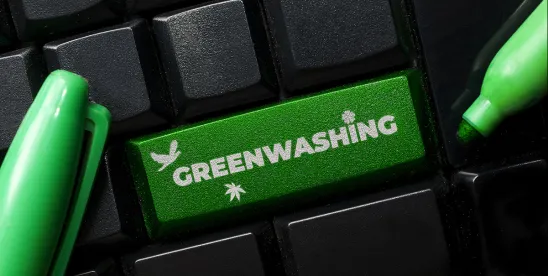WHAT YOU NEED TO KNOW IN A MINUTE OR LESS
One way that companies are choosing to address Environmental, Social, and Governance (ESG) concerns is by reducing their carbon footprint through procuring electricity from carbon-free or renewable energy sources.
Some companies have constructed on-site wind and solar generating facilities to provide electricity for their operations. Other firms have entered into power purchase agreements (both direct and virtual) with independent power suppliers for electricity sourced from renewable or carbon-free generation. Recently, some smaller industrial and commercial utility customers without resources to independently procure renewable power have been provided the option to sign up for their utilities’ green tariffs, which promise that some portion of the electricity delivered to green tariff customers will be supplied from renewable or carbon-free sources.
Companies taking these steps want to market their operations as “carbon-neutral” or powered by renewable energy, which may create a risk of greenwashing lawsuits.
In a minute or less, here is what you need to know about this increasing risk of liability.
Greenwashing Litigation Under Consumer Protection Laws
In a greenwashing lawsuit, a plaintiff accuses a business of making false statements about its ESG practices to appeal to consumer interest in environmentally friendly and sustainable practices. The specific causes of action vary from case to case, but often include state and federal claims of unfair and deceptive trade practices, fraud, and false advertising.
In 2012, the Federal Trade Commission (FTC) released its most recent set of “Green Guides,” detailing best practices for companies to avoid greenwashing litigation when marketing products and services. The Green Guides observe that it is deceptive to make unqualified representations that a product or service is made with renewable energy unless virtually all significant manufacturing processes are powered by renewable energy or the marketer has purchased an equivalent output of renewable energy certificates. While the FTC has not yet taken any enforcement actions against companies for unsupported claims on these grounds, other plaintiffs, including consumers and advocacy groups, have.
Targeting “Clean Energy” Claims
Advocacy groups recently brought two cases against oil companies, targeting the companies’ “clean energy” representations in advertisements. In March 2021, nonprofit Beyond Pesticides challenged Exxon Mobil’s marketing of its clean energy activities as misleading and a significant exaggeration of the oil company’s overall investment activity.1 In 2022, a group of environmental advocacy groups, citing the Green Guides, filed an FTC complaint against Chevron for misrepresenting its business as significantly invested in clean energy.2
Both cases point to the express and implied environmental benefits claimed by the oil companies, the lack of evidence to support those claims, and the reasonable consumer who is misled by those claims. Neither case, however, has yet been evaluated on its merits.
Targeting “Carbon Neutral” or “Low Carbon” Claims
In 2022, a consumer brought a class action lawsuit in federal court against Allbirds, which sells “sustainable” wool shoes, alleging Allbirds products are misleadingly labeled to have a low carbon footprint. The methodology used by a third party to certify Allbirds as low carbon did not account for the impacts of wool production, including water, eutrophication, methane emissions, or land occupation. The court, however, granted Allbirds’ motion for summary judgment, holding that the plaintiff could not show that a reasonable consumer would expect a different methodology. It found that Allbirds illustrates this methodology on its website, and a reasonable consumer would not expect nonatmospheric inputs from the production of raw materials to be included.3
Three Warnings for Companies Making “Clean Energy"-Related Claims
Lawsuits and FTC enforcement action may become more frequent against businesses producing clean energy advertisements without supporting those claims.
-
Recent cases indicate that consumers, advocacy groups, and government agencies are more likely to bring consumer protection claims against companies for misleading the public on clean energy operations.
-
The Green Guides (to be revised later this year) will continue to be the standard for greenwashing claims, but some state laws establish higher standards.
-
How courts define what a reasonable consumer would expect “carbon-neutral” and “clean energy” to mean may determine the level of risk present with these types of public representations.
Mitigating These Risks
As the focus on ESG evolves, companies can expect more regulation and guidance. At least eight states have gone above and beyond the FTC’s guidance to enact related consumer protection laws. The FTC intends to release a revised set of Green Guides in 2022, and the Biden administration’s “whole-of-government” approach to addressing climate change may encourage the FTC to exercise its enforcement powers more aggressively.
Businesses should continue to follow guidance in the current and forthcoming update to the FTC’s Green Guides. With assistance of counsel, businesses should analyze public statements against this guidance and evolving case law to ensure their representations are based on evidence sufficient to support their claims, even if certified by an independent third-party certifier.
We acknowledge the contributions to this publication from our summer associate Derek Kalbfleisch.
ENDNOTES
1 Beyond Pesticides v. ExxonMobil Corp., No. CV 20-1815 (TJK), 2021 WL 1092167 (D.D.C. Mar. 22, 2021).
2 Earthworks v. Chevron Corp., No. 7:21-cv-05238, 2022 WL 1136799 (S.D.N.Y. 2022).
3 Dwyer v. Allbirds, Inc., No. 7:21-cv-05238, 2022 WL 1136799 (S.D.N.Y. 2022).




 />i
/>i
